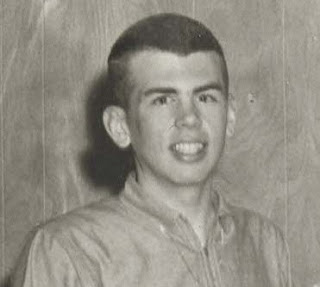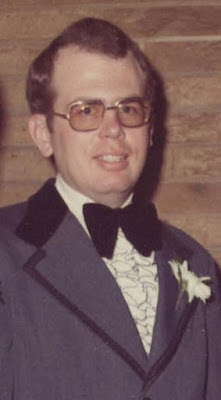 |
| Greg around 1999. |
He used it righteously as a quiet strength, especially in his later years when his behavior became more and more Christlike.
Greg was an achiever all through school. One of my favorite stories were when he was tapped his senior year to be the Business Office Manager of his high school’s yearbook.
This was highly unusual because kids served on the yearbook from year to year. Positions as a senior were earned by prior years of service on the yearbook staff. Not Greg, he was picked specifically and handed the plum position.
 |
| Yearbook staff picture from his senior year. |
Supertasking is Rare
I believe Greg was a Supertasker, one of the rare 2.5 percent of the population who actually can multi-task successfully juggling multiple things at the same time and doing them all well.
The existence of Supertaskers was discovered by a University of Utah professor in his research. I couldn’t get Greg to take the official test to determine if he was one. By that time he was quite old and felt he was no longer in his prime. He just didn’t want to.
However, he proved to his father at a very young age that he was a Supertasker. He was watching television and reading a book, at the same time. His father insisted that he couldn’t do both and to pick one or the other. Greg recited verbatim what he had just heard on the television and what he had just read proving that he could do both. He handed his father the book as proof. Incredulous, but convinced, his father let him pursue both activities simultaneously.
Greg often exhibited this ability to successfully multi-task during our marriage and in too many situations to mistake whether personal, together or in his professional occupations.
One memorable business trip, that I accompanied him on, took place somewhere in the South, I think. It wasn’t a particularly familiar area to any of us. We had two Brits from Greg’s home office in England along. Greg was driving the Dodge Grand Caravan, the company vehicle we were allowed to use as a personal one.
He had equipped his seat with a sort of backpack and side pack, a mini-mobile office. He also had supplies to the side of his right arm. While driving, Greg successfully retrieved, used and replaced a variety of items while he conducted a number of conversations with his company in England, his own office as well as various and sundry others.
He enacted an astonishing amount of business, concluding a number of negotiations as well as coordinating plane ticket, hotel accommodations and car rental for a future U. S. visit of his company’s research scientist and chemist.
Throughout this he was looking up phone numbers in his personal phone book, retrieving company credit cards and other information. (This was years before smartphone days where contact information is at your fingertips.)
When he got done, one of the Brits in the backseat asked, “Do you juggle too, Greg?”
The Law School Admissions Test (LSAT)
The one thing Greg was prone to brag about, although just slightly, was his Law School Admissions Test (LSAT) score. He didn’t have the actual record anymore, but his score placed him in about the top 2% of test-takers. He was told at that time he was operating at a 180 IQ level.
(Keep in mind IQ levels have altered slightly in measurement and description over the years.)
(Keep in mind IQ levels have altered slightly in measurement and description over the years.)
Management Knowledge
When Greg and I were dating and then got married, I was at the height of my career as a public administration professor. I bounced every obscure and common management theory off of Greg to see what he knew and what he didn’t.
Greg knew all the management concepts, just not always the label used in management research. After I explained the label, I could converse with him with ease.
In one respect, I was annoyed with him. I paid good money to know what I know. I have a Ph.D. in management after all.
It amazed me that he could even declare with confidence whether a management technique actually worked or would work.
It amazed me that he could even declare with confidence whether a management technique actually worked or would work.
I remember thinking, “It took a squad of Ph.D’s and gaboons of government research money to figure that out. Where does he get off just picking it up on his own?!”
I could converse with him on anything, not just management. Often incredulous after hearing him expound on some obscure topic he had never been trained or formally educated on, I would say, “How do you know that?” He would just shrug like brilliant people often do.
He never used his intelligence to alienate people. He didn’t highlight people’s stupidity. He just carefully explained things. It was always there and he trotted it out when he needed it but he didn’t taunt people and wave it in their faces as some people are prone to do.
One of my favorite examples is when he calmly, and unconcernedly explained the difference to me between squares and rectangles. I burst out laughing. Taken off guard, he asked, “What? What did I do?” I told him, “Do you realize you just explained the difference between squares and rectangles to a Ph.D.?”
He’d simply been doing what he always did, quietly teaching and clarifying something that he thought was mistaken.
Here’s his version of this story, straight from his journal entry, which I found after his death:
Greg’s teaching example, 06202017
Krista and I were sitting at our computers and had just discussed a case study presented by BYU-I. We had also split a chocolate bar. As I was cleaning up our two napkins and putting them together, both had been folded in half, I noticed that they were not of equal length. This surprised me, since I’d always thought they were square. Now I discovered that they were actual rectangles. I mentioned this to Krista, saying something about them not being the same size. Her reaction was: “That depends on how you fold them”. I then responded by unfolding one and, pointing to the four sides, pointing out that they are not equal and saying: “No, they are not squares, but are rectangles”.
My point, which I hadn’t explained very well, was that the napkins looked different (square or rectangle) depending on how you folded them.
Greg actually worked for The Church of Jesus Christ of Latter-day Saints for a short time. He wasn’t able to continue because his allergies and sinus problems were dramatically aggravated by what would have been his work environment. This was discovered during training.
However, the story I want to relate came from the application process. I can’t remember whether he had been hired at that time or if it was pending. He was given a test by Human Resources. He was told that it was given to all professional applicants, the ones with college degrees.
The girl that scored it told him that she didn’t wait, she took his results directly into top management she was so amazed. She told Greg, “I didn’t know it was possible to score this high.”
As established earlier, Greg stopped seeking the high-level prestigious and well-paying jobs by choice. However, they never stopped seeking him. Even after his death, I have fielded several inquiries via his email.
He, nor I, wanted to enter those waters again. Neither of us felt like it was worth it.
Brilliant to the End
My last story comes from the doctor that administered his biopsy in 2019 after his cancer was confirmed to have reoccurred, just a few months before Greg’s death. It took place at the hospital. The doctor in question was an M.D. and a specialist, probably in his mid-40s.
After conducting the biopsy and while Greg was dressing, the doctor came out to the waiting room to brief me on the procedure.
Apparently, he and Greg had had quite a conversation. That somewhat explained the length of time the procedure took. I had been waiting for a while. Greg had observed and questioned the doctor about every aspect of his equipment and procedure.
The doctor emphatically told me: “It’s obvious he’s a high-level executive!”
Next: Part 6: Tribute to My Husband Greg Cook - His Skills, People Skills and Social Skills
Next: Part 6: Tribute to My Husband Greg Cook - His Skills, People Skills and Social Skills
Continue reading at the original source →






